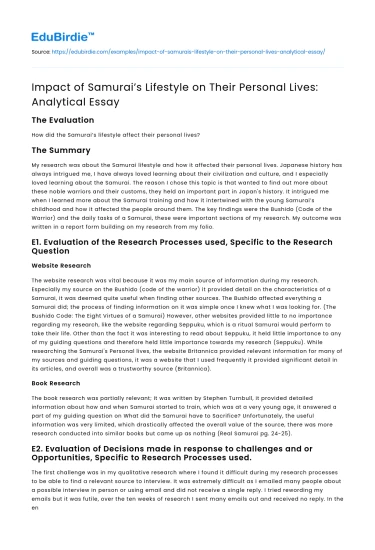Introduction
The samurai were more than just warriors in feudal Japan; they were a distinct class with a unique lifestyle that significantly influenced their personal lives. Rooted in the principles of Bushido, the code of honor and morals developed by the Japanese samurai, their way of life emphasized virtues such as loyalty, discipline, and honor. This lifestyle was not merely a professional identity but permeated every aspect of their existence, affecting family dynamics, social interactions, and personal development. Understanding the lifestyle of the samurai offers insights into how their personal lives were shaped by the stringent demands and expectations of their societal role. This essay explores the multifaceted impact of the samurai lifestyle on their personal lives, examining their family responsibilities, social standing, and the internal conflicts faced due to the dichotomy between personal desires and societal expectations.
Family Responsibilities and Dynamics
The samurai's lifestyle imposed stringent responsibilities towards their families, deeply influencing family dynamics and personal relationships. The expectations of loyalty and honor extended beyond the battlefield into the home, where samurai were expected to maintain these values as family heads. According to historian Stephen Turnbull, the samurai were "not only warriors but also family men, responsible for the welfare and honor of their kin" (Turnbull, 2008). Their role as a provider and protector often meant that personal desires were secondary to the needs of the family and clan. Marriages among samurai were frequently arranged to strengthen alliances and ensure loyalty, adding a political dimension to their personal lives. These unions, while strategic, often lacked the affection seen in modern relationships, as duty took precedence over personal emotions.
Save your time!
We can take care of your essay
- Proper editing and formatting
- Free revision, title page, and bibliography
- Flexible prices and money-back guarantee
Nevertheless, the samurai household was a microcosm of the larger societal structure, reflecting the hierarchical and patriarchal nature of feudal Japan. Women in samurai families, although subservient, played crucial roles in managing the household and ensuring the continuation of the family's honor and traditions. The samurai's duty to mentor their heirs in the way of Bushido further exemplified the intertwining of personal life and societal obligations. Thus, the samurai lifestyle, while providing structure and purpose, often restricted personal freedom and emotional expression, leading to a complex interplay of duty and personal sacrifice.
Social Standing and Interpersonal Relationships
The social standing of samurai was both a source of pride and a burden, influencing their interactions within society and their personal relationships. As members of the warrior class, samurai held a prestigious position in feudal Japan, bound by a code of conduct that governed their public and private lives. This elevated status came with the expectation of exemplary behavior, leaving little room for personal indiscretions. The samurai were expected to embody virtues such as bravery and integrity, which often led to a life of restraint and self-discipline.
However, this social standing also led to isolation from other societal classes, creating barriers to genuine interpersonal connections. The rigid class system of Japan meant that samurai could not easily form friendships with those outside their rank, often leading to a sense of loneliness despite their esteemed position. Real-life accounts, such as those of the famed samurai Miyamoto Musashi, illustrate this isolation. Musashi, despite his legendary status, led a largely solitary life, dedicated to perfecting his martial skills and adhering to the samurai code (Wilson, 2004). This dedication to the lifestyle often resulted in the suppression of personal desires, as any deviation from the expected conduct could lead to loss of honor and status, impacting not just the individual, but their entire family.
Internal Conflicts and Personal Sacrifices
The internal conflicts faced by samurai due to their lifestyle were profound, as they navigated the tension between personal desires and societal expectations. The samurai code of Bushido demanded unwavering loyalty and courage, often requiring personal sacrifices that tested their mental and emotional resilience. These internal conflicts were exacerbated during times of peace, when the absence of warfare left samurai searching for purpose and identity. The transition from warrior to bureaucrat or scholar, as necessitated by the Edo period's relative peace, posed significant challenges to their self-conception and personal fulfillment.
Moreover, the samurai's commitment to honor and duty often led to life-and-death decisions, such as the ritual of seppuku, or self-disembowelment, to restore personal honor or that of their family. This drastic measure underscores the extreme lengths to which samurai would go to uphold their principles, sacrificing their lives rather than suffering the disgrace of failure or dishonor. Literature from the period, such as the "Hagakure" by Yamamoto Tsunetomo, highlights the internalization of these values, suggesting that "the way of the warrior is death" as an ultimate expression of loyalty and honor (Tsunetomo, 1716).
Conclusion
The samurai lifestyle, with its rigid adherence to the principles of Bushido, profoundly influenced their personal lives, dictating their family roles, social interactions, and internal struggles. While it provided a sense of purpose and identity, it also demanded significant personal sacrifices and emotional restraint. The duality of their existence—between public duty and private desire—created a unique societal role that continues to fascinate historians and cultural scholars. By examining the complexities of the samurai lifestyle, we gain a deeper understanding of how the intersection of cultural values and personal lives shapes individuals within a society. Despite the dissolution of the samurai class in the late 19th century, their legacy endures, offering timeless lessons on duty, honor, and the human condition.






 Stuck on your essay?
Stuck on your essay?

